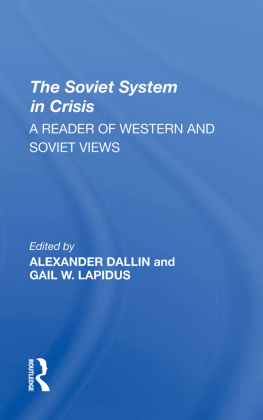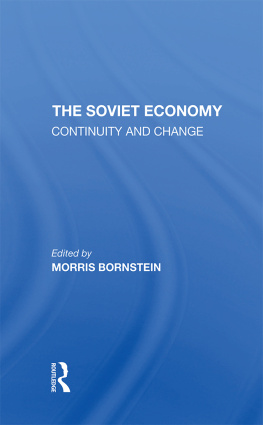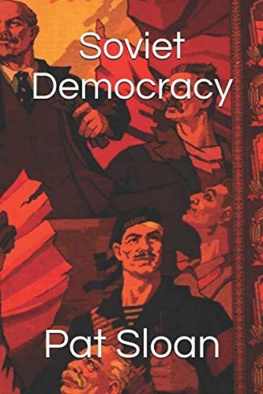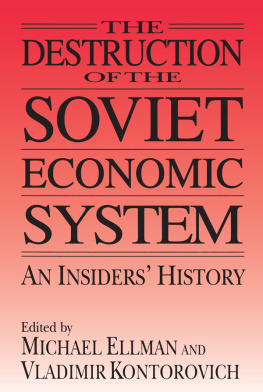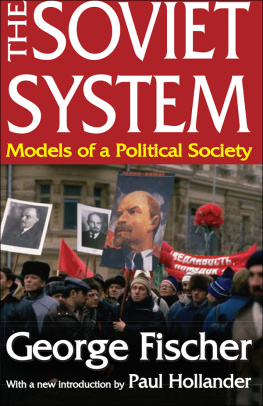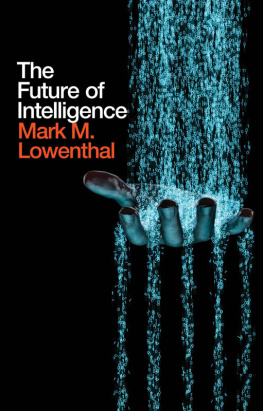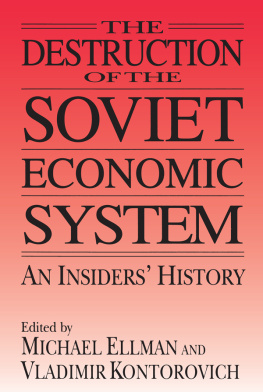Living Through the Soviet System
Living Through the Soviet System
Edited by
Daniel Bertaux, Paul Thompson & Anna Rotkirch
Memory and Narrative Series
First published 2004 by Transaction Publishers
First paperback edition published in 2006 by Transaction Publishers by arrangement with Routledge.
Published 2017 by Routledge
2 Park Square, Milton Park, Abingdon, Oxon OX14 4RN
711 Third Avenue, New York, NY 10017, USA
Routledge is an imprint of the Taylor & Francis Group, an informa business
2004 Editorial matter and selection, Daniel Bertaux, Paul Thompson, and Anna Rotkirch; individual chapters, the contributors.
All rights reserved. No part of this book may be reprinted or reproduced or utilised in any form or by any electronic, mechanical, or other means, now known or hereafter invented, including photocopying and recording, or in any information storage or retrieval system, without permission in writing from the publishers.
Notice:
Product or corporate names may be trademarks or registered trademarks, and are used only for identification and explanation without intent to infringe.
Library of Congress Catalog Number: 2005053815
Library of Congress Cataloging-in-Publication Data
Living through the Soviet system / Daniel Bertaux, Paul Thompson, and
Anna Rotkirch, editors.1st pbk. ed.
p. cm.(Memory and narrative series)
Originally published: On living through Soviet Russia. New York:
Routledge, c2004.
Includes bibliographical references and index.
ISBN 1-4128-0487-6 (pbk.: alk. paper)
1. Soviet UnionSocial conditionsCase studies. 2. Communism
and familySoviet UnionCase studies. 3. Soviet Union
Social life and customsCase studies. 4. Soviet UnionMoral
conditionsCase studies. 5. Oral history. I. Bertaux, Daniel. II.
Thompson, Paul Richard, 1935- III. Rotkirch, Anna, 1966- IV.
Title. V. Memory and narrative.
HN523.O6 2005
306'.0947dc22
2005053815
ISBN 13: 978-1-4128-0487-5 (pbk)
Contents
DANIEL BERTAUX, ANNA ROTKIRGH AND PAUL THOMPSON
PART I
Creating Soviet Society
DANIEL BERTAUX, IN COLLABORATION WITH MARINA MALYSHEVA
VICTORIA SEMENOVA
EKATERINA FOTEEVA
PART II
Personal and Family Life
ANNA ROTKIRCH
VICTORIA SEMENOVA AND PAUL THOMPSON
ANNA ROTKIRCH
NAOMI ROSLYN GALTZ
PART III
The Marginal and the Successful
IRINA KOROVUSHKINA PAERT
NANCI ADLER
MARIANNE LILJESTRM
DANIEL BERTAUX, PAUL THOMPSON AND ANNA ROTKIRCH
Guide
Nanci Adler is Associate Professor at the Center for Holocaust and Genocide Studies of the Royal Netherlands Academy of Arts and Sciences. She is author of two books, The Gulag Survivor and Victims of Soviet Terror, and of many articles on the consequences of Stalinism.
Daniel Bertaux is Directeur de Recherches at the Centre d'Etudes des Mouvements Sociaux, Ecole des Hautes Etudes en Sciences Sociales, Paris. He has been a researcher for the CNRS since 1968, and his originally quantitative research on social mobility led him to discover the value of qualitative life stories. His researches have included studies of bakers, of families and social mobility in France and in Russia, and of absent fathers. He is founder of the Biography and Society Research Committee of the International Sociological Association, and first President of the Sociological Association of France. His books include Destins personnels et structure de classe, Biography and Society, La mobilit sociale, Les rcits de vie, and (with Paul Thompson) Pathways to Social Class.
Ekaterina Foteeva was a researcher at the Institute of Sociology, Russian Academy of Sciences, Moscow, from the mid-1980s to the mid-1990s. She participated in various projects on family sociology and social policy, and oral-history studies of family social mobility. In 1996 she moved to Canada to work on a project on migration, and she now lives in Toronto.
Naomi Roslyn Galtz is an Assistant Professor in the School of Interdisciplinary Studies at Miami University. Her work focuses on everyday life, play/space, material culture and sustainable consumption. Presently she is pursuing a new US-based project on discourses of simplicity in consumption.
Marianne Liljestrm is Professor of Women's Studies at the University of Turku, Finland. She has published articles on Nordic, and Soviet women's history, and a book (in Swedish) on the Soviet gender system, and she is currently writing a book on Soviet women's autobiographies.
Marina Malysheva was an interviewer with the Bertaux Russian families project, and is a researcher at the Institute for Socio-Economic Studies on Population, Moscow.
Irina Korovushkina Paert is a Lecturer in History at the University of Wales, Bangor. She began researching on the Old Believers as a student, at the Urals State University, Yekaterinburg. Her book on this, Old Believers , Religious Dissent and Gender in Russia, is forthcoming with Manchester University Press.
Anna Rotkirch researches in Sociology at the University of Helsinki, Finland. She has specialised in comparative research on families and sexuality, autobiographical research and Russian studies. She is author of The Man Question: Loves and Lives in Late Twentieth Century Russia and co-editor of Women's Voices in Russia Today.
Victoria Semenova is a Lead Researcher at the Institute of Sociology, Russian Academy of Sciences in Moscow, and she teaches sociological methods at the Russian State Humanities University in Moscow. She is author of a book on qualitative methods in Russian and of articles in Family and History and BIOS. She is especially interested in narrative analysis and in intergenerational issues.
Paul Thompson is Research Professor in Sociology at the University of Essex, and a Fellow at the Institute of Community Studies in London. He is Founder-Editor of Oral History and Founder of the National Life Story Collection at the British Library National Sound Archive, London. His books include The Voice of the Past , The Edwardians, and The Work of William Morris. He is co-author of Growing up in Stepfamilies , of The Myths We Live by (with Raphael Samuel), and (with Daniel Bertaux) of Pathways to Social Class.
1
Introduction
Daniel Bertaux, Anna Rotkirch and Paul Thompson
For a period of over seventy years after the October 1917 Revolution in Russia, talking about the past, either political or personal, became extremely dangerous for many. In a society dominated by a giant system of internal espionage, talking about yourself could always leave perilous clues, hostages to fortune. Who could know which neighbours or friends were informers to the authorities? And to reveal that any relative or close connection had ever been in political trouble, or fought on the wrong side in the Civil War, or was descended from aristocrats or well-to-do peasants ( kulaki ) or even shopkeepers, could put anyone at risk of unemployment or banishment to the political prison camps in Siberia and elsewhere. In such a context, there was no chance of successful interview-based research, either by Russians or by outsiders, and understanding of what was really going on in Russia was thus generally left, in terms of politics, to 'Kremlinologists' whose prime skill was reading between the lines of Pravda and other official newspapers or, for economy and society, to a painstaking wringing-out of perspectives from published statistics, policy documents and literature.




